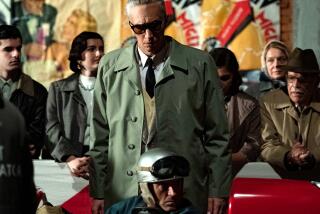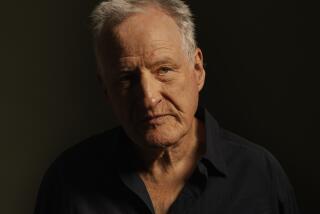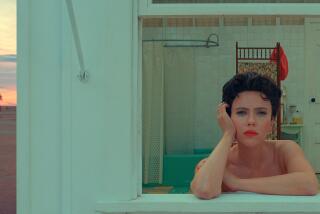Renoir’s ‘Coach’ at Monica 4-Plex
- Share via
The English-language version of Jean Renoir’s exquisite but rarely seen “The Golden Coach,” newly restored by the Cinematheque Francaise, commences a two-week run Friday at the Monica 4-Plex. Adapted by Renoir and others from Prosper Merimee’s play “La Carrosse du Saint-Sacrement,” it was filmed in Italy in 1952 in rich Technicolor and starred Anna Magnani in one of her most glorious performances.
Magnani is Camilla, or La Perichole, the tempestuous star of a hardy commedia dell’arte troupe that has endured a five-month sea voyage to Peru--the time is the early 18th Century--in hope of bettering its fortunes in the New World. The ragged little company is deposited in Lima’s principal plaza along with the viceroy’s splendid new golden coach, in which Camilla had made her bed during the voyage. Camilla is like a breath of fresh air in the staid court of the viceroy (Duncan Lamont).
Just when “The Golden Coach” seems no more than a light romantic comedy, a feast for the eyes with quaintly colonial baroque settings, it broadens its perspectives to achieve the kind of impact we associate with those classic Renoirs, “Grand Illusion” and “The Rules of the Game.” For we become ever so gradually aware that the frivolity--the artificiality--of the viceroy’s court is but a mockery of the notion of civilization in whose name such oppression is meted out to the native population. Renoir’s vision is too profound to stop at protest, and he proceeds to offer a meditation on art and life as Camilla begins to wonder where the one leaves off and the other begins. In answer to this and other questions, “The Golden Coach” pulls off a stunning coup de theatre in which art and life seem to merge--as they did in Jean Renoir himself. Information: (310) 394-9741.
Effective Extremes: Sentimentality and violence have always gone hand-in-hand on the screen, but seldom have they been carried to such extremes and played against each other with such effectiveness as in writer-director John Woo’s “The Killer” (at the New Beverly Sunday and Monday), an example of the highly addictive, supercharged, go-for-broke Hong Kong cinema at its most deliberately outrageous. Woo sets off a plot with more twists and turns than a drive up Hong Kong’s Victoria Peak with the simplest of premises: A hired killer (Chow Yun-fat) takes one one last job but accidentally blinds a nightclub singer (Sally Yeh) while opening fire all over the joint. As a man of honor, he must accept yet another last job to pay for the cornea transplant that will restore her sight. Woo is intent on seeing just how far he can go in serving up violent exploitation fare while turning his entire film into a tribute to different genres; it’s as if he wants to evoke the carnage of “The Wild Bunch” and the kinetic fury of “The French Connection” but restore to the screen a code of honor of vintage Hollywood Westerns and gangster movies. Information: (213) 938-4038.
More to Read
The biggest entertainment stories
Get our big stories about Hollywood, film, television, music, arts, culture and more right in your inbox as soon as they publish.
You may occasionally receive promotional content from the Los Angeles Times.










